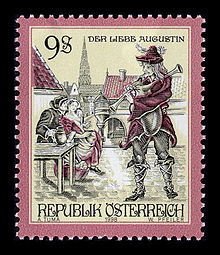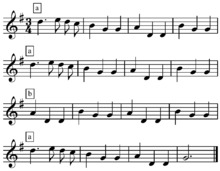- Oh du lieber Augustin
-
"Oh du lieber Augustin" ("Oh, you dear Augustin") is a Viennese song, composed by Marx Augustin in 1679.
At this time Vienna was struck by the bubonic plague (see Great Plague of Vienna) and Augustin was a ballad singer and bagpiper, who toured Vienna‘s inns entertaining people. The Viennese loved Augustin because of his charming humour in bitter times and they called him "Lieber Augustin" (Dear Augustin). Once he was drunk and on his way home he fell in the gutter and went to sleep. He was mistaken for a dead man by the gravediggers patrolling the city for dead bodies. They picked him up and dumped him, along with his bagpipes which they presumed were infected, into a pit filled with bodies of plague victims outside the city walls. Next day when Augustin woke up, he was unable to get out of the deep mass grave. He was shocked and after a while he started to play his bag pipes, because he wanted to die the same way he lived. Finally people heard him and he was rescued from this dreadful place. Luckily he remained healthy despite having slept with the infected dead bodies and Augustin became a symbol of hope for Viennese people.
The story lives on in the song Oh du lieber Augustin ("Oh, you dear Augustin"), which is still popular in Austria. The tune is nearly identical to the tune of Did You Ever See a Lassie?, as they share the same notes, but the only difference is that it is longer and more melancholy than that song.
Contents
Text of the song
-
- O, du lieber Augustin, Augustin, Augustin,
- O, du lieber Augustin, alles ist hin.
-
- Geld ist weg, Mensch ist weg,
- Alles hin, Augustin.
- O, du lieber Augustin,
- Alles ist hin.
-
- Rock ist weg, Stock ist weg,
- Augustin liegt im Dreck,
- O, du lieber Augustin,
- Alles ist hin.
-
- Und selbst das reiche Wien,
- Hin ist's wie Augustin;
- Weint mit mir im gleichen Sinn,
- Alles ist hin!
-
- Jeder Tag war ein Fest,
- Und was jetzt? Pest, die Pest!
- Nur ein groß' Leichenfest,
- Das ist der Rest.
-
- Augustin, Augustin,
- Leg' nur ins Grab dich hin!
- O, du lieber Augustin,
- Alles ist hin!
Text and melody: Marx Augustin (1679)
Another Version
Refrain:
Ach, du lieber Augustin,
Augustin, Augustin,
Ach, du lieber Augustin,
Alles ist hin!1. Geld ist hin, Mädl ist hin,
Alles ist hin, Augustin!
Ach, du lieber Augustin,
Alles ist hin!Refrain
2. Rock ist weg, Stock ist weg,
Augustin liegt im Dreck.
Ach, du lieber Augustin,
Alles ist hin!Refrain
3. Und selbst das reiche Wien,
Hin ist's wie Augustin;
Weint mit mir im gleichen Sinn,
Alles ist hin!Refrain
4. Jeder Tag war ein Fest,
Jetzt haben wir die Pest!
Nur ein großes Leichenfest,
Das ist der Rest.Refrain
5. Augustin, Augustin,
Leg' nur ins Grab dich hin!
Ach, du lieber Augustin,
Alles ist hin!Translation
Refrain:
O, you dear Augustin,
Augustin, Augustin,
O, you dear Augustin,
All is lost!1. Money's gone, girlfriend's gone,
All is lost, Augustin!
O, you dear Augustin,
All is lost!Refrain
2. Coat is gone, staff is gone,
Augustin lies in the dirt.
O, you dear Augustin,
All is lost!Refrain
3. Even that rich town Vienna,
Broke is like Augustin;
Shed tears with thoughts akin,
All is lost!Refrain
4. Every day was a feast,
Now we just have the plague!
Just a great corpse's feast,
That is the rest.Refrain
5. Augustin, Augustin,
Lay down in your grave!
O, you dear Augustin,
All is lost!Use in other musical works
During the classical era the song was a popular theme for variations. E.g. the composer Paul Wranitzky featured it in orchestral variations, in variations for xylophone, strings, trumpet and drums, and as the trio to the menuetto of his Symphony op 33 no 3. Johann Nepomuk Hummel wrote S 47, WoO 2 - Variations for orchestra on "O du lieber Augustin" in C major.
The tune appears quoted (recognisably, but in a dissonant context) in the midst of the 2nd movement of Arnold Schoenberg's 2nd Quartet, written a month before the height of Schoenberg's marital crisis. An additional significance attaches to the quotation in view of the quartet being the work in which Schoenberg decisively abandons the traditional key-system and embraces consistent atonality.
Use in popular culture
Danish poet and author Hans Christian Andersen (1805-1875) uses a moderated form of its refrain in his fairy tale The Swineherd from 1841. It goes as this: "Ach, du lieber Augustin/Alles ist weg, weg, weg!"
The Johns Hopkins University band plays the song whenever the Blue Jays lacrosse team scores a twentieth goal against an opponent. The tradition was started by the school's longtime Bavarian-born band leader, Conrad "Gebby" Gebelein. Scoring at least twenty goals was a regular occurrence for the Blue Jays during the 1950s and 1960s.[2]
The song has been adapted as a Scouting campfire song with the title "Fish and chips and vinegar". Fish and chips and vinegar.
In Dutch-speaking countries the melody is used for the Sinterklaas song: "Daar wordt aan de deur geklopt." (http://kristinhall.org/songbook/ForeignSongs/AchDuLieberAugustin.html)
The tune is often used as background music in animated cartoons whenever a German character is introduced. It can be heard in a comedic, almost taunting version to mark the appearance of Hitler in 1940s World War II propaganda cartoons like The Blitz Wolf, The Ducktators, Tokio Jokio,...
This song is featured during "Disorder in the Court," a Three Stooges short subject, Moe swallows a harmonica, and emits different notes depending on where Larry and Curly touch him. They use this to their advantage and begin playing the song.
In the animated show Animaniacs the song is also often played in the background when German, Swiss or Austrian characters are introduced. In a similar way, Alouette would be used when introducing French persons or places.
In The Simpsons episode "The Otto Show", the children sing a song called "Hail To The Bus Driver" under the tune of "Oh du lieber Augustin".
The song also occurs in the Bob Hope movie My Favorite Spy where one of the characters is named Augustine. When Bob Hope's character finds him lifeless, he says: "Ach, du Lieber! Augustine!"
The melody appears, somewhat deconstructed, in the song "Spinning Wheel" by Blood, Sweat and Tears.
The children's song "The More We Get Together," is also sung to the same tune.
References
- ^ Copland, Aaron & Slatkin, Leonard (2011). What to Listen for in Music,[page needed]. ISBN 9780451531766.
- ^ The Lore of Victory: JHU Lacrosse Quiz, Johns Hopkins Magazine, Johns Hopkins University, retrieved June 4, 2009.
External links
Categories:- Austro-Bavarian words and phrases
- German folk songs
- History of Vienna
- Busking
-
Wikimedia Foundation. 2010.


